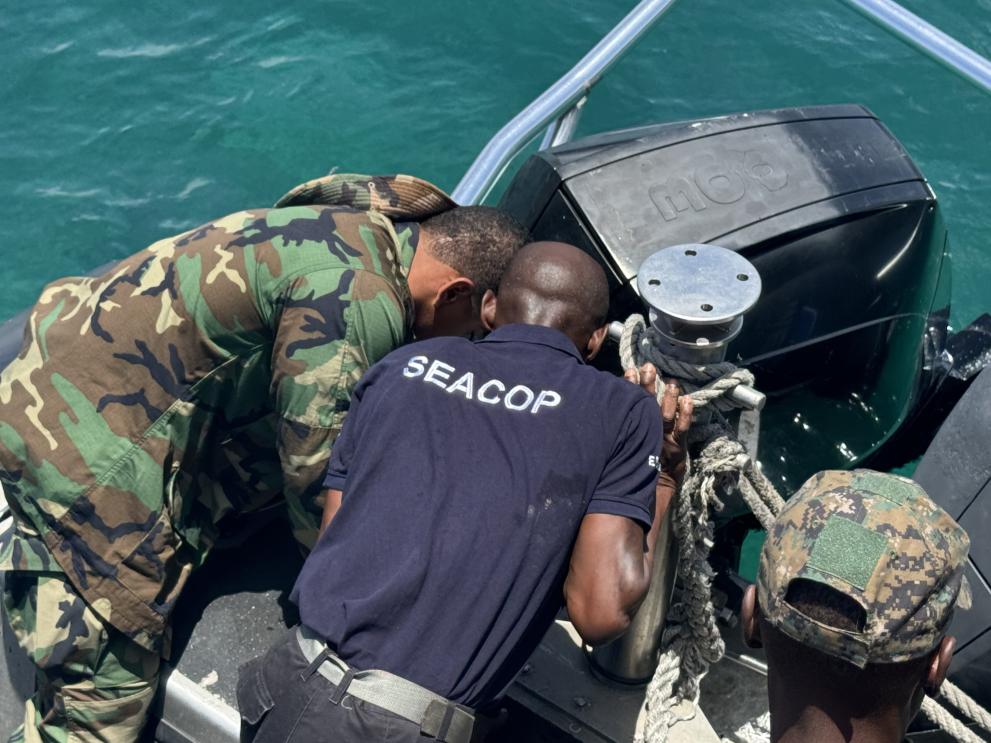
Ten years ago, a new wave of cooperation quietly set sail across the waters of the Caribbean. Starting with a few trainings back in 2015, that wave has now become a tide. A tide marked by strong regional partnerships, enhanced maritime security, and an unwavering commitment to combating illicit trafficking at sea. At the heart of this success lies SEACOP: the European Union-funded Seaport Cooperation Project.
Deployed across three strategic regions affected by maritime trafficking, Latin America, the Caribbean and West Africa, SEACOP has become solidly entrenched in the Caribbean over the years.
It is now a cornerstone of the region’s maritime security efforts, helping national authorities from 13 countries to tackle transnational illicit trafficking through intelligence sharing, inter-agency coordination, and training.
At the Crossroads of Trafficking
“The Caribbean is unique by virtue of its geographical location,” explains Alexander Kellman, SEACOP’s Deputy Regional Coordinator for the Caribbean, and himself a participant in the very first cohort of trainees back in 2015 in Barbados. “It sits right between the source and consumer markets, becoming as such a natural transit zone for criminal networks.”
While local consumption is limited, the region’s geography and porous maritime borders make it an ideal corridor for illicit shipments. Criminal organisations exploit this vulnerability, using the region’s vast maritime space to move everything from narcotics and ammunition to counterfeit goods, live animals, and even endangered flora.
“Unfortunately, small island nations don’t always have the resources, financial but also human, to respond to those threats effectively. This is where SEACOP comes in,” continues Kellman.
Regional Trust, Real Results
SEACOP’s structure itself reflects the region’s realities. Unlike other parts of the world, Caribbean nations often lack the resources for full-time, dedicated maritime teams. Instead, SEACOP trains “virtual teams”: inter-agency units that remain embedded in their home organisations but mobilise seamlessly when intelligence or operations demand.
“If we need to act at 2 a.m., we know who to call, and we know they’ll answer,” Kellman explains. “Our networks are strong because we built them on trust, communication, and shared goals.”
“Our networks are strong because we built them on trust, communication, and shared goals.”
This decentralised, responsive approach has proven highly effective, with over 120 successful seizures achieved by SEACOP-supported teams across the region, involving drugs, weapons, and other illicit cargo.
Even more importantly, a network of professional trust and operational readiness now exists where before there were often silos.
“SEACOP gave us the tools, the framework, and the partnerships,” says Lieutenant Commander Graham Rocheford of the Barbados Coast Guard. “It has improved how we coordinate nationally, and with our regional neighbours. We respond faster, and we operate more effectively.”
“What we have now is a level of connectivity we didn’t have before,” Rocheford adds. “That’s a direct result of SEACOP’s influence.”
Training that Translates into Action
At the heart of the project’s strategy is capacity building. From advanced vessel search techniques to intelligence-led operations, SEACOP has trained over 750 officers from coast guards, customs agencies, and police departments across the Caribbean in the last five years.
One such officer is Davina Charles, a member of the Royal Grenada Police Force. After joining a SEACOP training early in her career, she quickly advanced to become an instructor herself, helping to deliver the very training that once shaped her professional path.
“The exposure and knowledge I gained through SEACOP changed the way I approach my work,” Charles recounts, explaining “it’s hands-on, it’s practical, and it’s regionally relevant. When you put that training into action, you really see the impact.”
Her story reflects the broader vision of SEACOP: a model of training the trainers which ensures that skills stay within the region and continue to grow over time. “When we train together and share what we know, we become stronger as a region.”
A Decade of EU-Caribbean Cooperation
Backed by the European Union, SEACOP exemplifies what long-term, strategic cooperation can look like. It combines technical expertise, on-the-ground presence, and a deep understanding of regional realities.
“SEACOP is one of our most effective and respected programmes in the Caribbean,” says Małgorzata Wasilewska, the EU Ambassador to Barbados and the Eastern Caribbean. “It brings together the best of expertise in a way that’s focused, practical, and deeply collaborative.”
As it celebrates 10 years of operation in the Caribbean, SEACOP’s story is not just one of seizures and arrests, but of trust built across borders, of officers empowered by training, and of shared values taking root.
“We’ve come a long way in ten years,” concludes Kellman. “But what makes me most proud is knowing that when we move, we move together.”
Details
- Publication date
- 10 June 2025
- Author
- Service for Foreign Policy Instruments
